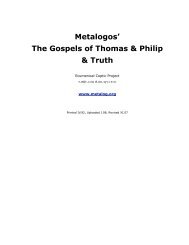Andrew Louth - Syriac Christian Church
Andrew Louth - Syriac Christian Church
Andrew Louth - Syriac Christian Church
Create successful ePaper yourself
Turn your PDF publications into a flip-book with our unique Google optimized e-Paper software.
60 THE DOCTRINE OF THE PERSON OF CHRIST<br />
The Fathers…openly confessed the difference between the two<br />
natural, but not gnomic, wills in Christ. They did not however<br />
say that there was any difference of gnomic wills in Christ, lest<br />
they proclaim him double-minded and double-willed, and<br />
fighting against himself, so to speak, in the discord of his<br />
thoughts, and therefore double-personed. For they knew that it<br />
was only this difference of gnomic wills that introduced into our<br />
lives sin and our separation from God. For evil consists in<br />
nothing else than this difference of our gnomic will from the<br />
divine will, which occurs by the introduction of an opposing<br />
quantity, thus making them numerically different, and shows<br />
the opposition of our gnomic will to God.<br />
(56BC)<br />
The idea that Christ did not deliberate (which is what is meant by not<br />
having a ‘gnomic will’) seems very strange, since deliberating between<br />
different choices is what we are accustomed to think that freewill is<br />
all about. In the course of her criticism of current trends of moral<br />
philosophy in the The Sovereignty of Good, Iris Murdoch at one point<br />
observes that ‘freedom is not strictly exercise of the will, but rather<br />
the experience of accurate vision which, when this becomes<br />
appropriate, occasions action’ (Murdoch 1970, 67). From this point of<br />
view deliberation is what we fall back on when our vision is clouded or<br />
confused: it is a measure of our lack of freedom, not the signal exercise<br />
of freedom. That Murdoch may help us to understand Maximus’<br />
picture of Christ is not perhaps surprising. Earlier on in The<br />
Sovereignty of Good, she maintains that ‘one of the main problems of<br />
moral philosophy might be formulated thus: are there any techniques<br />
for the purification and reorientation of an energy which is naturally<br />
selfish, in such a way that when moments of choice arrive we shall be<br />
sure of acting rightly?’ (Murdoch 1970, 54). That is a good way of<br />
formulating the approach of Byzantine ascetic theology, not least the<br />
approach of Maximus. And Maximus’ ascetic theology is, as we have<br />
seen, closely bound up with his dogmatic theology.




